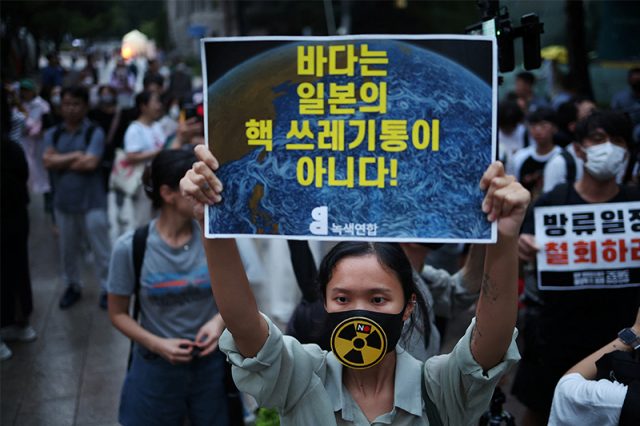
SEOUL — South Korea’s majority opposition party and civic groups around the country stepped up protests on Wednesday against Japan’s plan to release water from the Fukushima nuclear plant a day ahead of the planned start of the discharge.
Conservative President Yoon Suk Yeol’s government has come under criticism as it defended the position that its own assessment found no problems with the scientific and technical aspects of Japan’s plan.
“We intend to hold the Yoon government responsible for failing to do its duties,” opposition Democratic Party leader Lee Jae-myung said at a party meeting, calling Japan’s plan to discharge water from the Fukushima plant an act of “terror”.
Public concern remains high in South Korea over the plan to release more than 1 million metric tons of treated radioactive water starting at 1 p.m. Japan time on Thursday, with a majority of people expressing worry over seafood and ocean contamination, according to surveys.
In a July public survey by the pollster Media Research, 62% of the people said they would cut back or stop consuming seafood once the discharge goes ahead, despite the South Korean government’s assurances to closely monitor the release.
Democratic Party members and Foreign Minister Park Jin clashed in parliament over the possibility of direct impact to South Korea.
Park said currents will carry the water around the Pacific along the Americas before it reaches South Korea’s shores in four years containing less radioactive tritium than normal sea water.
Park also repeated the government’s position that its assessment does not necessarily mean it endorses Japan’s idea.
Japan has said that the water release is safe. The International Atomic Energy Agency (IAEA) approved the plan in July, saying that it met international standards and that the impact it would have on people and the environment was “negligible”.
Documents from the Japanese government and the Fukushima plant operator show that radioactive contaminants will be removed from the water before it is pumped into sea, leaving only traces that are far below regulatory standards.
South Korea said it accepted IAEA’s conclusion.
China has been vocal in its opposition, calling the move “extremely selfish” and on Tuesday summoning Japan’s ambassador to lodge a diplomatic protest.
Environmental and civic group chapters in the southern regions of neighboring Japan rallied in protest on Wednesday, assailing Tokyo for threatening fishery products and jeopardizing the safety of Pacific countries, according to the Korea Federation for Environmental Movements.
Fisheries industry groups plan to meet this week to review a response, focused on mitigating the expected sharp decline in seafood consumption.
The Democratic Party plans to hold a candlelight rally Wednesday evening, followed by a march on Thursday in Seoul toward the presidential office and a public rally on Saturday.
“Japan is about to bring irreversible calamity to South Korea and Pacific rim countries with the release of radioactive contaminated water,” Lee said at the party meeting.
— Reporting by Jack Kim. Editing by Gerry Doyle









